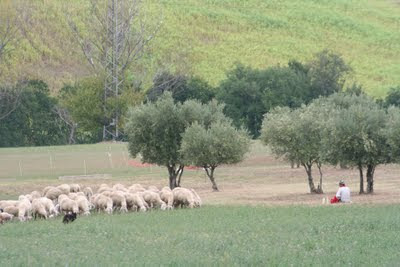

Hilltop villages, winding roads, a shepherd sitting on a red blanket while his pecorino sheep browse, sunflower fields flattened to grids of black stalks and deeply ploughed raw umber earth bordered by silvery olive groves... this is Le Marche in autumn. Not picture postcard but with an earthy ruggedness.
I’ve just spent a week across the valley from Urbisaglia, a town at the crossroads between coast and interior where the Roman town of Urbs Salvia once existed. Its amphitheatre, still fairly intact, and the stones of its aquaduct, cisterns, baths, theatre and tombs all that remain of the colony that reached its height during the first half of the 1st century BC and was utterly destroyed by the Visigoths under Alaric in about 410 AD.
Walking the winding farm road down from our villa near Paterno, across the valley to Urbisaglia, with the vineyards in the distance catching the low sunlight and the spires and towers of far hilltop towns taking on the chalkiness of frescoes, stirs the writer in me and puts me in the mood to set a story based here. Fired up by Roman ruins I’m breathing in a sense of place.
But its another story I discover... too big to write... that completely overwhelms me.
The internment camp of Urbisaglia was one of the first to be established by the Ministry of the Interior in Italy in 1940. The first inmates were Italian Jews who were suspected of having anti-fascist sympathies. Soon after, other ‘refugees’ began arriving from outside Italy... from Germany, Austria, Poland, Romania, Slovenia and Dalmatia.
In the peaceful surrounds of the Abbadia di Fiastra where 12 Cistercian monks still live, is the Villa Bandini – a huge Palazzo where the inmates were held. There were hundreds of beds on the floor and a large hall was used as a refectory but the building was still overcrowded. They were given access to the park and a small synogue was allowed to exist inside the building.
According to testimonies, the Jews were well accepted by the people of Urbisaglia. Many of the interns were merchants, painters and doctors, who spent their time helping with farm work or using their professions in some way amongst the locals.
Its hard to discover their true story. I’m relying on words translated from Italian. And its made more difficult to even imagine while walking in the sublime surroundings of the Abbadia, that apart from a few escapees, all of the people held here were finally transferred to extermination camps.
The following was written by the only survivor of Auschwitz from Urbisalglia’s internment camp, by a man named Paul Pollak:
‘Before my stay in Urbisaglia I was in a German concentration camp and after Urbisaglia, I was at Auschwitz where prisoners could talk to all Eurorpean countries, and was able to compare the fate and treatment of Jews in other countries. I always had this spirit in the camp of Urbisaglia. Humane treatment of its inmates will always receive full marks for Italy and a document of his noble ancient civilization and his sincere piety. In the hours and dark grey in Auschwitz, we have always seen in front of us, like a mirage, the bright garden of Urbisaglia in Italy, a country of sun and good people.’



7 comments:
This is truly fascinating Dianne.Thanks so much for posting it.
All you ever seem to do is travel Dianne! A rich and interesting piece. Great inspiration.
Paul Pollak's words are heartbreaking. What a novel this could make!
Wow! A great place for the muse. Glad you enjoyed the visit.
Yes... certainly awakens the muse. For anyone interested Elizabeth Bettina has brought out a book 'Bad Times, Good People' which comments on what happened during the war there. I haven't read it but it seems to have stirred up quite a reaction.
My paternal grandfather also survived the camp at Urbiscalia and I am looking for more information on this as I am writing a book about my father and grandfather. My grandfather, Josef Teutelbaum escaped with 5 others right before they sent the rest to auschwitz. interesting story told to me by my father
I have a list of the detainees. Dianne, if you have any other info, could you contact me at jon@jonbaum.com
I have found a letter from Jakubowski Isidor he was immate in Urbisaglia in july 1941 with his wife Rosa and a son They came from Berlin
Where can I find more information about this camp in 1941 and about Jakubowski familly?
thanks for your help
Post a Comment